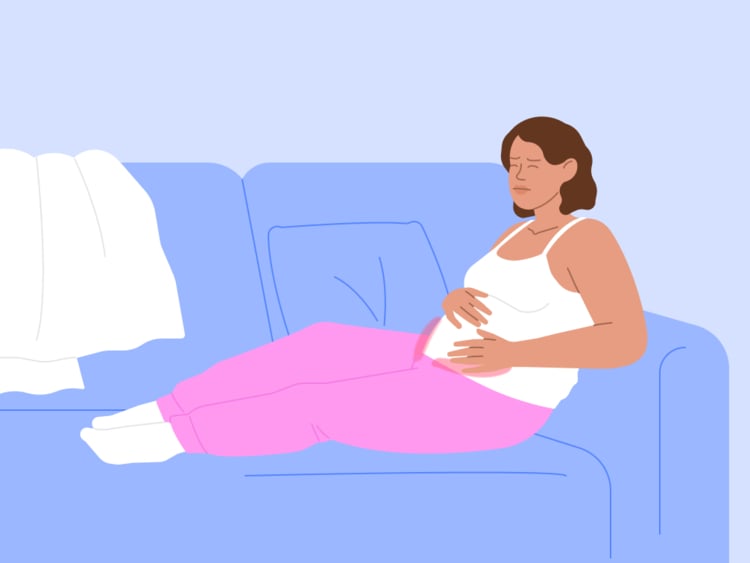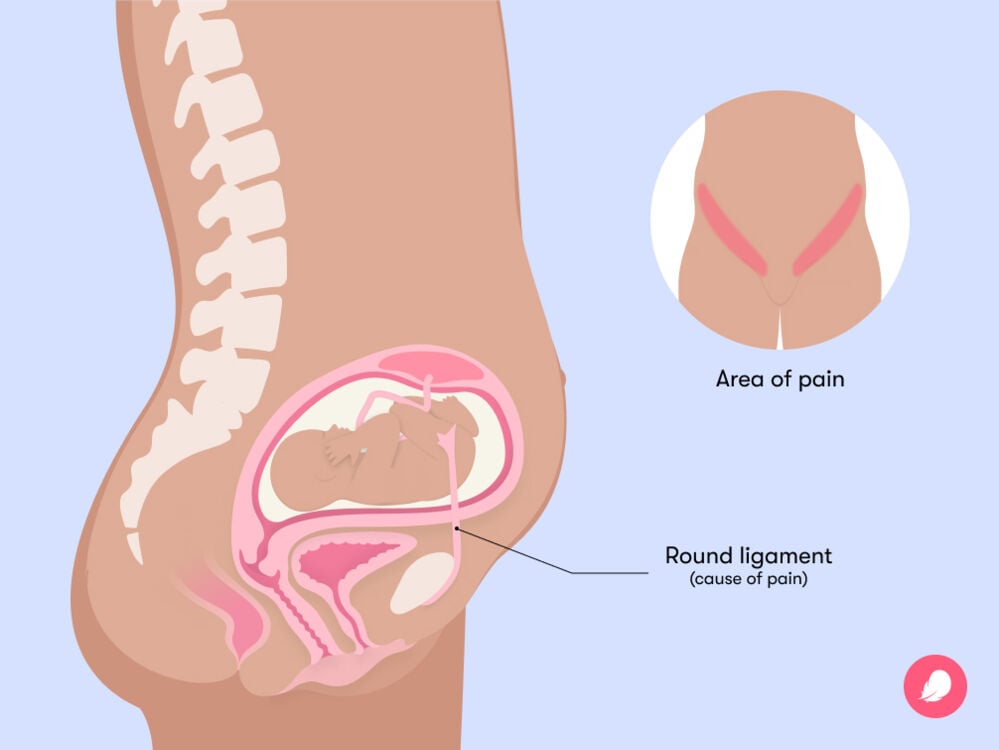What exactly is round ligament pain, and what can it feel like? We’ve got all the information you need, as well as first-hand stories from Flo members.
-
Tracking cycle
-
Getting pregnant
-
Pregnancy
-
Help Center
-
Flo for Partners
-
Anonymous Mode
-
Flo app reviews
-
Flo Premium New
-
Secret Chats New
-
Symptom Checker New
-
Your cycle
-
Health 360°
-
Getting pregnant
-
Pregnancy
-
Being a mom
-
LGBTQ+
-
Quizzes
-
Ovulation calculator
-
hCG calculator
-
Pregnancy test calculator
-
Menstrual cycle calculator
-
Period calculator
-
Implantation calculator
-
Pregnancy weeks to months calculator
-
Pregnancy due date calculator
-
IVF and FET due date calculator
-
Due date calculator by ultrasound
-
Medical Affairs
-
Science & Research
-
Pass It On Project New
-
Privacy Portal
-
Press Center
-
Flo Accuracy
-
Careers
-
Contact Us
What does round ligament pain feel like during pregnancy?


Every piece of content at Flo Health adheres to the highest editorial standards for language, style, and medical accuracy. To learn what we do to deliver the best health and lifestyle insights to you, check out our content review principles.
Pregnancy is a time of huge change in your body. After all, you’re growing a brand new human from scratch. So it makes sense that you might experience some aches and pains along the way.
One of the things you might experience is round ligament pain, which generally happens during your 2nd trimester. While this might be a worrying symptom to experience at first, especially if you’re a first-time mom, rest assured it is a common and totally normal pregnancy condition. Most importantly, it isn’t dangerous for you or your baby.
But what exactly is round ligament pain, and where can you expect it to hurt? We turn to the Secret Chats, the friendly community space on the Flo app, to hear from our members about their experiences of round ligament pain. We’ve also combed through the research to bring you all the information you need.
Key takeaways
- Round ligament pain is a common symptom of pregnancy, usually in the 2nd trimester.
- It can happen because your uterus gets bigger as your baby grows, which means the two ligaments holding your uterus in place (your round ligaments) also stretch.
- Round ligament pain should eventually ease on its own, but there are ways you can get relief if it’s bothering you, including stretching and getting lots of rest.
- You can use the Flo app to track your pregnancy, keeping up to date with your baby’s growth and how your body may change.
What is round ligament pain in pregnancy?
First up, what are round ligaments? Essentially, they’re like two 10 to 12-centimeter-long (around 4 in) straps attached to each side of your uterus. You may never have heard of them before, but they have an important role: They connect the uterus to the pelvis, helping to hold it in place.
As your uterus stretches during pregnancy, it also stretches your round ligaments, which can cause them to spasm. These spasms are what cause the pain you might experience. It’s also why round ligament pain is often described as a “growing pain” during your pregnancy. Everyone is different, but some find the sensation can get worse over time or be triggered by sudden movements, like turning over, standing up suddenly, coughing, or sneezing.
“I have to roll out of bed or get up super slowly, or I’ll get a sharp pain (usually lower right belly, sometimes left or both). Also, sneezing [is] not fun,” writes one Secret Chats member. Another adds: “You’ll notice it often when switching sides, stretching, getting up too quickly, or making sudden movements.”
You might find that only particular movements trigger the pain. Another Flo member shares: “Crazy how if I turn a certain way, I feel jabbing or stabbing pain.”
Where will you feel round ligament pain?
The easiest way to spot round ligament pain from other types of abdominal aches in pregnancy is by tuning in to the location of the pain. Round ligament pain is usually felt on one or both sides of your lower belly. In comparison, Braxton Hicks contractions (also known as “practice” contractions) are usually only felt in the front of your abdomen, while labor contractions tend to start at your lower back and move around to the front of your abdomen.

When does it start?
You’re most likely to experience round ligament pain during your 2nd trimester. “Round ligament pain has been a constant in my 2nd trimester,” says one person in Flo’s Secret Chats.
However, everyone experiences pregnancy differently. Round ligament pain can also happen earlier or later in your pregnancy for some people, as a 1st or 3rd-trimester symptom. Or you might not get it at all.
How long does it last?
If you’ve got round ligament pain, you’re probably wondering how long the cramps can last. Can round ligament pain last all day? For weeks? For months?
As with many pregnancy symptoms, experiences of round ligament pain can differ from person to person. But as a guide, experts say the pain usually lasts for a few minutes, although it can go on longer, and it’s likely to come and go. “It’s not severe, just constant when it happens,” says one Flo member of their experience.
What does round ligament pain feel like?
Round ligament pain can feel like a sharp, jabbing pain. Let’s hear some experiences from Flo members:
- “It feels like something inside is being stretched beyond the possible limit.”
- “It’s sharp but short-lived.”
- “I’ve been having round ligament pains that last for hours. It’s so annoying.”
- “It feels like a sharp, jabbing, cramping pain on either side of your lower abdomen. It can be a shooting pain from your groin area up to the side of the abdomen.”
- “I am 13 weeks, and [for the] past few days, it feels like [I’m being] kicked in the crotch. Am I the only one? Seriously hurts to move or walk — it feels bruised.”
As we can see, experiences of round ligament pain are unique. With that in mind, try not to compare your pregnancy with others. And remember that if you do experience any belly aches during pregnancy, it might not necessarily be due to round ligament pain. There are other normal reasons for abdominal pain in pregnancy, including:
- Trapped wind from excess pregnancy gas, caused by the body producing higher levels of progesterone
- Constipation
- Braxton Hicks contractions
- True labor contractions
Take a quiz
Find out what you can do with our Health Assistant
Relief for round ligament pain
Thankfully, round ligament pain should generally pass on its own. However, there are a few tricks you can try to help you prevent it from happening or get some relief if it does.
- Belly band: A maternity belly band can give your bump extra support, helping to ease the strain on your round ligaments.
- Stretches: Some people find that gently stretching, flexing, or bending their hips can help to reduce round ligament pain. Certain daily stretching exercises can also help, such as getting on your hands and knees and lowering your head to the floor.
- Prenatal yoga: This can also be a great way to stretch out your hip area. Just note that it’s worth checking with a health care professional whether prenatal yoga will suit your pregnancy before getting started.
- Rest: Getting plenty of rest can certainly help, so go ahead and schedule that lunchtime nap.
- Sleeping position: Speaking of rest, experts advise that you should try to sleep on your side (either your left or right) during pregnancy, and you could also try using a pregnancy pillow to keep you comfortable as your bump grows. That way, you’re less likely to make any sudden movements that might trigger the pain.
Severe pain
For many women, round ligament pain is mild. However, some people find the pain more debilitating.
If your round ligament pain is severe and the common relief methods aren’t helping, it’s a good idea to contact your doctor. They can check you over and run any tests to make sure that you and your baby are both OK.
When should you see a doctor?
Unless it’s severe, round ligament pain on its own isn’t generally anything to worry about. While it might be uncomfortable and initially a bit alarming, especially if you’re a first-time mom, remember that it’s perfectly normal and won’t harm you or your baby.
That being said, you should always call a health care professional if you notice any of the following symptoms along with abdominal pain:
- Fever and/or chills
- Bleeding
- Nausea and vomiting
- Difficulty walking
- Contractions
If you’re feeling anxious or unsure about any abdominal pain during pregnancy, it’s always better to contact a health care professional just in case. Remember, they’re there to help ensure your pregnancy is as healthy as possible, so don’t ever feel guilty about reaching out to them.


Hey, I'm Anique
I started using Flo app to track my period and ovulation because we wanted to have a baby.


The Flo app helped me learn about my body and spot ovulation signs during our conception journey.


I vividly
remember the day
that we switched
Flo into
Pregnancy Mode — it was
such a special
moment.
Real stories, real results
Learn how the Flo app became an amazing cheerleader for us on our conception journey.
References
Churches, J. Round Ligament Pain in Pregnancy. Royal Berkshire NHS Foundation Trust, Dec. 2021, www.royalberkshire.nhs.uk/media/1l5dy01i/physio-round-ligament-pain-in-pregnancy.pdf.
Raines, Deborah A., and Danielle B. Cooper. “Braxton Hicks Contractions.” StatPearls, StatPearls Publishing, 8 Aug. 2023, www.ncbi.nlm.nih.gov/books/NBK470546/.
“Round Ligament Pain.” Cleveland Clinic, https://my.clevelandclinic.org/health/symptoms/21642-round-ligament-pain. Accessed 9 Oct. 2024.
“Stomach Pain in Pregnancy.” NHS, www.nhs.uk/pregnancy/related-conditions/common-symptoms/stomach-pain/. Accessed 9 Oct. 2024.
“Tiredness and Sleep Problems in Pregnancy.” NHS, www.nhs.uk/pregnancy/related-conditions/common-symptoms/tiredness/. Accessed 9 Oct. 2024.
“Week 15.” NHS, www.nhs.uk/start-for-life/pregnancy/week-by-week-guide-to-pregnancy/2nd-trimester/week-15/. Accessed 9 Oct. 2024.
Zachariah, Sanoop Koshy, et al. “Management of Acute Abdomen in Pregnancy: Current Perspectives.” International Journal of Women’s Health, vol. 11, Feb. 2019, pp. 119–34, doi:10.2147/IJWH.S151501.
History of updates
Current version (28 October 2024)
Published (28 October 2024)
In this article

Get your personal guide to pregnancy with the Flo app
-
Follow your baby's growth week by week
-
Get expert info on symptoms, safe foods, and more
-
Chat with other parents-to-be




